
Anand Madhvani, Journal Letter No.5 - Dec 2003
Dear Friends,
The past three months since my last letter have been quite varied and bitty. Schools have been busy with exams, and winding down before the long Christmas summer break. The main school intervention I have been involved with has therefore been on hold, temporarily, freeing up some of my time for other adventures.
Apart from continuing systems development work at our office, I've been hosting visitors, doing some travelling and taking stock. I made my first visit to the UK in a year, seeing my family and friends, catching up with all the new little people that have arrived over the course of my first year away (so many babies!). It's amazing to see how much my life, and those of some of the people I am close to, can change over such a short period of time.
Having just turned 30 last month, and survived this far, it's been a natural time to take stock and think about future directions.
It's also been a time to review how my placement has developed to date, and what priorities there are for the future. To that end, Martin Wilkinson from QPSW visited for an infernally long time, and we had several productive discussions with my host organisation. The upshot of which is that everyone is very happy, my host organisation and myself are very grateful for the opportunities this placement has given us (thank you!). There is lots more to do, and my placement is being extended to a second year.
One specific thing which is likely to develop over the coming year is our involvement with prisons in South Africa. The AVP workshops we run began in prisons in the USA, but soon spread to more mainstream communities. This broadening focus partly followed a growing recognition that the violence encountered in prisons often begins in a domestic setting.
Since AVP came to South Africa in the 90's, much of our work has actually been outside prisons, with different types of communities, and schools. (The main exception is large number of workshops - over 90 since 2000 - we have carried out with youth awaiting trial).
However, we are looking to now start several prison interventions in the Johannesburg area, and probably in Kwa-Zulu Natal and the Eastern Cape as well.
Conditions in prisions are generally terrible. Aside from the overcrowding, and active gang warfare in some establishments, HIV/AIDS and forced sodomy can combine to make even a short custodial term into a death sentence. Last week there was a program on television detailing two recent cases where individuals are taking legal action against the Department of Correctional Services for mistreatment and failure in their duty of care. One now has a colostomy bag, after botched attempts to remove packets of drugs that had been forcefully inserted into his rectum by other prisoners, to smuggle them into the prison. Both individuals were later found innocent of the crimes they had been held for, but obviously no-one should endure some of the things that are happening regularly. At the youth detention centre we have been working at, youngsters were dying in custody on a frequent basis. This seems to have stopped once our AVP workshops began, at least according to anecdotal evidence.
Yesterday I met Theresa and Ronald Watts, of the Friends Africa Interest Group. They wanted to meet a contact who had recently left prison, and was starting some kind of agricultural project north of Pretoria - could I, and my QPSW car, help get them there? It was an extremely hot day, and grew hotter and more uncomfortable as we approached the shallow bowl Pretoria nestles in. A few half-hearted clouds were building up, but always in the distance, too far away to offer any comfort from the burning sun. After Pretoria, the landscape settled into a typically African pattern of dry scrub, quite unlike the fields around Johannesburg. This was uncharted territory for me, and we had to use both a printed and more detailed hand-drawn map, guesswork, luck, and a mobile phone before the reason for our visit came into sight at the side of the road, waiting patiently with a borrowed bicycle.
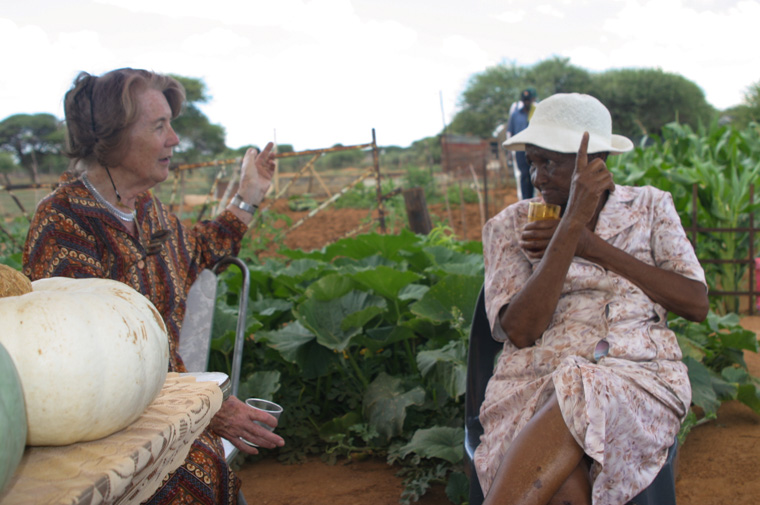
Ronald and Theresa Watts have decades of rich experience, yet were still learning
Alfred doesn't mind me sharing with you that he was in prison for eight years of a ten-year sentence. That is a very large part of a person's life, and hard for me to think about. However he doesn't seem bitter about this, accepting responsibility for his actions, and seems to have avoided some of the worst aspects of prison life. When asked about this, he says that he mixed mainly with the church crowd within the prison. He also helped the warders by talking with the younger prisoners, helping them keep out of trouble.
Right now, he rides the bicycle, wobbling rather worryingly, in front of us and turns of the main road, past a series of smallholdings and through a few turns, before we reach his mother's house. What we find there is astonishing. Alfred is disparaging about the house - it is a tin shack, but a fairly large, well kept one, with electricity, a fridge and running water.
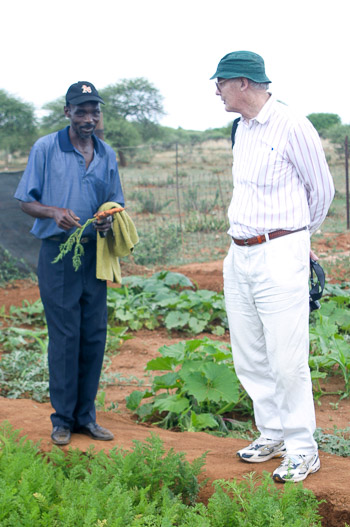
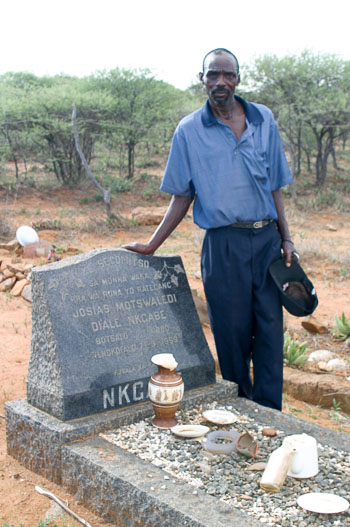
Alfred with Ronald, and next to his father's grave
It's obviously the garden that matters more to him, which is packed full of pumpkins, maize, potatoes, onions and other good things. His mother, a sprightly and spirited seventy-one year old, and other relatives are also there to meet us. I'm parched, but it was a long time before we actually sat down at the table prepared for us, laden with enormous pumpkins and cold water - the garden has us mesmerised.
The richness of the crops is a shock after the heat and dryness of our journey. The water used in the garden is currently unmetered, but ominously that may soon change. The soil has only been under cultivation for a season, and may have been enriched by manure that would have been mixed in to form the foundations of the home that once stood there. It's therefore not clear how sustainable this all is, especially when (as his relatives tell me, laughing and disapproving) that he keeps giving all the vegetables away.
Alfred is quite aware of these potential problems, and is thinking ahead. He's clearly aware that he needs more information, and different solutions. Mechanisation, in the form of a tractor, is an option he favours, especially as he has land near the river with rich, black soil, which he remembers being farmed when he was a child. Cheap access to water, safeguarding the food as it grows from people and animals, and finding markets are real problems. I've seen a number of promising urban agriculture projects around Johannesburg, Cape Town and Gabarone. What is possible with a little land, effort, waste water and composting is astonishing. Given the combination of unemployment, food poverty, nutritional needs and relatively large unused gardens in townships here (deliberately set aside by apartheid-era planners for 'natives' to grow their own 'mealies') it seems obvious what should happen.
Yet it doesn't, and Alfred's garden is an exception, a little green oasis. He himself says that some people in the neighbourhood have tried experiments of their own, but others 'don't get it'. The vast majority of yards are simply barren and dusty. I know how many people have devoted time, energy, research and ideas to developing urban agriculture over decades, but it is still not widespread, and I puzzle about why. Have all the technical concerns been addressed, without cultural and perceptual blockages being ironed out? Is it a problem of ownership of the solution, or have people just become too disconnected with the land? I simply don't know what it is, but it feels as if a key piece of this jigsaw is still missing.
I want to find out more, and expect Alfred has some ideas about where the bottlenecks are.
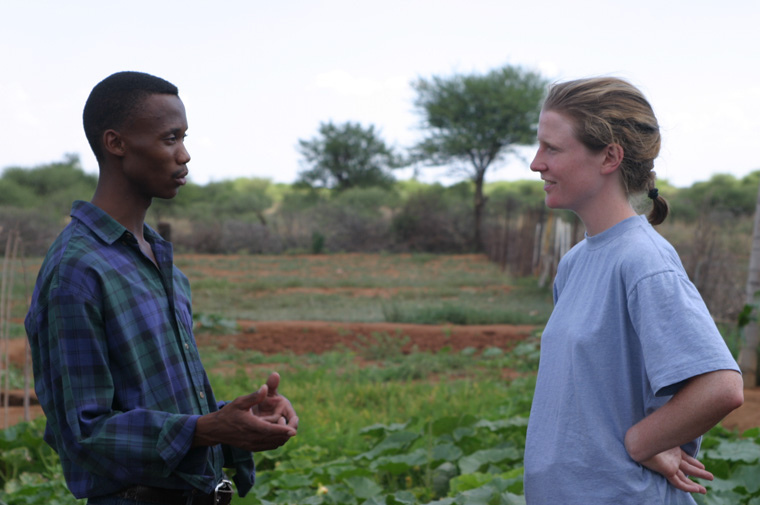
my friend Jane, now officially Sister Hilda
Unfortunately our visit could only be a short one, but I have a feeling that we'll have more opportunities to follow up on this topic and others. I'm hatching plots to get Alfred involved in our AVP workshops, suspecting he'd make an excellent facilitator. He's interested to find out more, having already worked with younger prisoners, and actively involving his nephews in the garden. If we are going to do more work in prisons next year, his experience and insights will be very valuable. On a practical level as well, the small honorariums we pay to facilitators (unusually for AVP internationally, but important here) may also be helpful.
The morning after our visit, Alfred calls to ask me how our journey back to Johannesburg went, and to tell me happily that it rained heavily that night.
with best wishes,
Anand
Admiring the crops in Alfred's garden, and comparing techniques
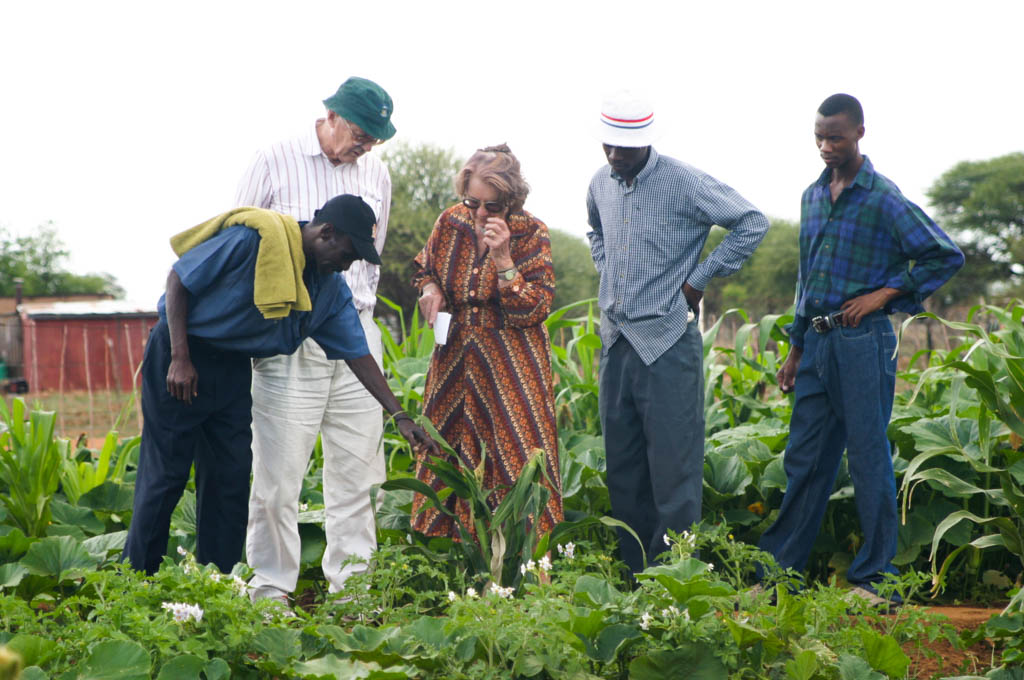
 ⥢
⥢
 ⥤
⥤